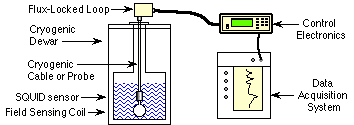[sws_button class=”” size=”sws_btn_small” align=”sws_btn_align_left” href=”http://tristantech.com/wp-content/uploads/2013/10/Intro-to-SQUIDs.pdf” target=”_blank” label=”Download the PDF” template=”sws_btn_midnightblue” textcolor=”000000″ fontweight=”normal” bgcolor=”” bgcolorhover=”” glow=”sws_btn_glow” btnwidth=”” textalign=”center”] [/sws_button]
[sws_divider_small_padding]
The SQUID (Superconducting Quantum Interference Device) is the world’s most sensitive magnetic flux detector. It is often referred to as a cryogenic or superconducting magnetometer, and indeed the measurement of extremely small magnetic fields is one of its most important applications. However, the scope of the SQUID’s usefulness extends far beyond simple field measurements. Almost any low frequency electric or magnetic signal that can be converted into a corresponding magnetic flux signal will be detected at a greater level of sensitivity with a SQUID than with any other instrument. Applications of SQUID systems have ranged from the investigation of magnetic and electronic properties of materials to the search for geothermal energy sources, from studies of paleomagnetism to biomagnetic research and from the measurement of millikelvin temperatures to the detection and characterization of subsurface magnetic structures on land and at sea.
The basic components of a SQUID System:

Because of their superconducting nature, the SQUID sensor must be kept at cryogenic temperatures, usually in an insulating vessel called a dewar. Other components may be necessary to complete the measurement process.
Tristan Technologies supplies both low temperature (liquid helium or LTS) and high temperature (liquid nitrogen or HTS) SQUID systems and components, including electronics, sensors, probes and dewars. Descriptions of some of the items supplied by Tristan can be found in this web site.


